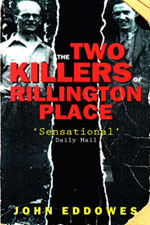The Two Killers of Rillington Place
 John Reginald Halliday Christie was already the murderer of at least two victims when Timothy John Evans, much younger and with an IQ of 65, came to live with his wife at 10 Rillington Place. Christie is supposed to have framed Evans over the killing of his wife and baby daughter, and was even the principal Crown witness against Evans. Refuting claims that Evans was innocent of the crimes for which he was hanged but years later granted a free pardon, this book sets out to show that it was in fact Evans who killed both his wife and child, and then tried to blame Christie, who at that time had the bodies of two women buried in his garden. The book also argues that Beryl Evans was not even present at 10 Rillington Place when Christie was supposed to have been strangling her there; that, to accept Evans as innocent, we should have to believe in far greater improbabilities and absurdities than the presence of two stranglers in one house; that Evans tried to kill his wife more than once, just before the murder itself; that evidence showing Evans to be guilty was available at the time; and that commentators both then and since have altered the evidence to proclaim Evans's innocence.
John Reginald Halliday Christie was already the murderer of at least two victims when Timothy John Evans, much younger and with an IQ of 65, came to live with his wife at 10 Rillington Place. Christie is supposed to have framed Evans over the killing of his wife and baby daughter, and was even the principal Crown witness against Evans. Refuting claims that Evans was innocent of the crimes for which he was hanged but years later granted a free pardon, this book sets out to show that it was in fact Evans who killed both his wife and child, and then tried to blame Christie, who at that time had the bodies of two women buried in his garden. The book also argues that Beryl Evans was not even present at 10 Rillington Place when Christie was supposed to have been strangling her there; that, to accept Evans as innocent, we should have to believe in far greater improbabilities and absurdities than the presence of two stranglers in one house; that Evans tried to kill his wife more than once, just before the murder itself; that evidence showing Evans to be guilty was available at the time; and that commentators both then and since have altered the evidence to proclaim Evans's innocence.
Publisher: Little, Brown & Company (23 Jun 1994)
ISBN-10: 0316909467
ISBN-13: 978-0316909464
John Eddowes, an independent investigator, has done his homework and discovered that Evans was an extremely violent character who tried to kill his wife not long before the murder. He cites medical evidence to show that Evans was, technically speaking, a psychopath who was always losing control.
But, above all, he performs a ruthless dissection of Ludovic Kennedy’s book, highlighting its ‘errors, omissions and alterations’ and producing a brilliant and totally damning account of Kennedy’s arguments. He points out that when Kennedy was asked, at the Brabin inquiry of 1968, about some particularly misleading attack on the police, he admitted: “Yes, that is wrong.” Yet in a paperback edition of 10 Rillington Place, 20 years later, the same incorrect statement has been left unchanged.
But there is one enormous obstacle to believing that Evans was innocent: at Notting Hill police station, he confessed to the murder of his wife and baby, not once but three times. It was only after talking to the murderer Donald Hume in jail — who advised him to change his story then stick to it — that Evans accused Christie of the murders.
If Evans was innocent, why did he confess in such circumstantial detail to the murders? According to Kennedy, because he was virtually ‘brainwashed’ by shock, and said whatever the police wanted to hear. But anyone who reads Evans’s confessions can see that this is just not on. No one could sound so precise and circumstantial if he was innocent.
Christie had no reason whatever to kill the baby even if he had murdered Beryl Evans. And if he hadn’t killed her then it would have been sheer madness to kill the baby.
But the case he presents is nevertheless, quite overwhelming. After this book, it should be impossible for any sensible person to believe in the innocence of Timothy Evans.
Colin Wilson
Evening Standard